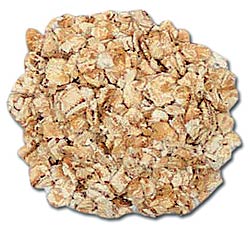 By Heather A lot of people consider having cereal for breakfast as healthy; indeed, as grain is the base of most cereals you would be forgiven for immediately assuming it's all healthy. Grains are all naturally low in salt, sugar and fat. However, lots of cereals of have a crazy amount of sugar added to them usually as actual sugar and sometimes as dried fruits. For this week, we went out and found out how much sugar some of the most popular brands of cereal have:
That's almost one-fifth sugar in a cereal marketed as a dieting aid. What?! See Kellogg's or Nestle's website for more detail. But I eat a lot less than 100g! Are you sure? If you look on the box the recommended portion size normally ranges from 30g to 45g. The only way to be 100% sure of how much you are eating is to weigh it out. 30g is a lot less than you think!! Getting into weighing out your cereal is an easy habit to develop. I've been doing it for years now. My little secret I always weigh my oats out (I eat them 6 out of 7 days a week); however, if I want to have something like Alpen or Jordan's Crunchy Oat Granola - I recognise this is as a treat, I don't weigh it because I will only feel guilty. That said, I have a little trick that stops me from over-eating: I pour the cereal into a cup NOT a bowl. I am pretty sure I have more than a 100g of Jordan's Crunchy Oat Granola but I can live with that because I seldom have it. So how should you shop for cereal? Look for cereals with under 5g of sugar per 100g! 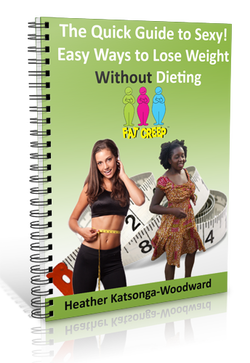 Although your personal finances and your business success are my primary interest, I believe you only operate at peak efficiency when you're fit and healthy. If you feel good, it filters through to your work. To help you with that, click for your free ebook: The Quick Guide to Sexy
0 Comments
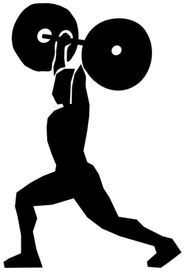 By Heather Another request by a regular Fat Creep reader; please keep your queries coming guys, I've been responding to requests for the last month straight and I love that. The simple answer is yes BUT if your periods have stopped, it's very unlikely that the cause is too much exercise. It is very difficult to exercise 'too much' especially if you have a desk job. However, a highly restricted diet is much more likely to stop your periods. Amenorrhea is the term given to a cessation of periods. It is common in people suffering from anorexia, models who aren't eating enough and athletes who aren't replenishing their bodies adequately. Why exactly do periods stop if you're not eating enough? Your body goes into starvation mode. This means it shuts down the activity of all unnecessary bodily functions and organs. This includes the reproductive system as well as nutrition to hair and nails. To stop your periods from occurring the hypothalamus stops releasing the hormones involved in the regulation of periods. This then causes a reduction in oestrogen and progesterone, the main female sex hormones. What are the consequences of your periods stopping due to a poor diet? In the long-run a lack of oestrogen and progesterone could result in:
What should you do if your periods have stopped?
What should you be eating?
In summary, if your periods have stopped it's likely due to a poor diet and/or an underlying medical problem e.g. Polycystic Ovarian Syndrome, PCOS.
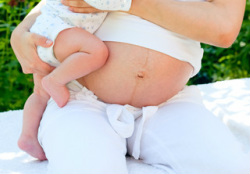 By Heather This is a request from another fervent Fat Creep follower. I have never had a baby myself but the research I've just done will hopefully prepare me for balancing being a mum with being hot. Losing weight after having a baby is different to losing weight under other circumstances because your nutrition affects the baby and the hormonal changes can make you moody and therefore more likely to give in to temptations. 1. Eat nutritiously whilst you are pregnant and continue afterwards Pregnancy is not a time to be dieting. That said, lots of people use being pregnant as an excuse to eat lots of junk. If anything you should be eating more nutritiously than ever. Everything that you eat passes from you to the baby. Monitor your cravings. If you want cake, make it yourself - supermarket-bought cake contains preservatives that you don't want to pass on to the baby. 2. Empty your cupboards of all junk food It's likely that you'll mostly be housebound in the first few weeks after birth. If you don't have any unhealthy snacks around you can't give in to temptation. 3. Simple exercises count It will be tough to do any hardcore exercises initially because you'll be exhausted, your body will be going through a lot of hormonal changes and you simply won't have the time. If you're used to being very active you might feel annoyed that you can't do more but you need to be content with doing exercises like lifting light weights and going for walks. Try to do three 10-minute bouts of exercise a day, four days a week. That's good start. 4. Get an exercise DVD or find a fitness channel It can be fun. With a DVD or fitness channel you won't have to come up with your own exercise. 5. Don't feel guilty about handing the baby over to someone else so you can go out to get some exercise Is your husband doing his fair share of the work? Yes you are a mum but there's nothing wrong with wanting to have time for you. Even within the first week there's nothing wrong with you leaving the house to exercise. It's likely that grandma and grandpa will be around at the start; let them have some alone time with the baby. 6. Breastfeed! Breastfeeding burns an extra 500 calories per day. That alone is a great reason to breastfeed. I don't know why everyone doesn't do it. Some people claim to have dropped all their baby weight by breastfeeding alone. The calories you burn will fall as you start to wean the baby. 7. Get support Boredom stimulates the appetite. As exciting as having a baby is, you do need mental stimulation from adults. Join mother's support groups. If possible, invite a friend or relative to come and stay with you in the months following the birth. Having company means you'll have more time for you. I hope the above helps. If you're a mum please share any extra tips with us. 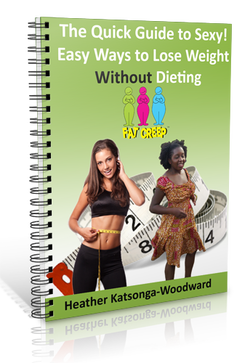 Although your personal finances and your business success are my primary interest, I believe you only operate at peak efficiency when you're fit and healthy. If you feel good, it filters through to your work. To help you with that, click for your free ebook: The Quick Guide to Sexy 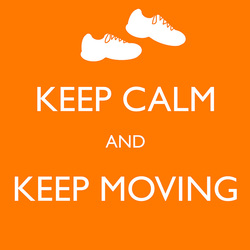 By Heather It's so frustrating isn't it? You're doing everything you can and every time you jump onto the scale your weight hasn't changed. You might not be losing weight because: 1. You're not eating as healthily as you think If you are calorie tracking and have set yourself a fixed calorie allowance per day you need to be very strict. If you want to track accurately you can't even pop a grape into your mouth without accounting for it. This is especially true if you are getting close to your ideal weight. The more overweight you are the larger the impact of small changes on your weight loss. However, as you get closer to a normal weight you need to eat a lot better to lose anything. Do not eat mindlessly. Learn to say no to offers of food. There's always a reason to celebrate and you have to say, no! Solution: calorie count to remind yourself how you should be eating It's easy to forget how many calories are in food. I recommend that every three or four months you do a week of calorie counting. I find calorie counting so time intensive but I think doing just a week can help you with discipline and it will remind you what foods you should be eating. 2. You're not burning enough calories To lose 1 lb of weight a week you need a deficit of 3,500 calories per week. This can come from a combination of burning more calories and eating fewer calories. You might be burning less than you think. Solution: discount gadget estimates It's very hard to estimate the calories burnt by a particular exercise. If you're using a gadget that tells you how many calories you've burnt, I recommend discounting the value by at least 10% to account for inaccuracies. 3. You're building muscle Muscle weighs more than fat so I wouldn't worry if you can see that your body is changing but the scale says you weigh the same. The more muscle you build, the more calories you will burn at rest. Solution: just keep at it, you'll start losing weight again soon 4. Hormonal changes e.g. due to stress your hormones might be resisting change If you are suffering from stress deal with that underlying issue. High stress levels stimulate increased production of the hormone cortisol. Cortisol promotes fat storage. Solution: destress 5. The compliments are getting to you I recently went home for a holiday and everyone was complimenting my weight loss. They were astounded that I wasn't chubby any more. It felt great and unfortunately I felt as though it gave me license to eat more liberally, and I did. I had a piece of cake almost everyday for two weeks! Do you think this could be happening to you? Solution: don't let compliments get to your head, use them to egg you on. Is it the type of food you are eating? It's better to substitute junk food with healthy alternatives but ultimately it's the total number of calories that you eat that matters. Whatever you eat, have a small portion. Portion control is the ultimate problem for most people and dealing with just that is massive progress. Consistency and time I am personally still working on losing weight but sometimes I go for a couple months without losing anything. On the plus side I have been on a general downward trend and I'm not gaining weight either. I have learnt that consistency makes a big difference especially consistent exercise. Don't be impatient. Give your body time to adjust to changes in your diet and in your exercise regime. If your exercise schedule is too ambitious you will feel discouraged when you miss a session and might end up giving it up altogether. It's better to exercise twice a week only consistently than to exercise four times in one week and then do nothing for two weeks. 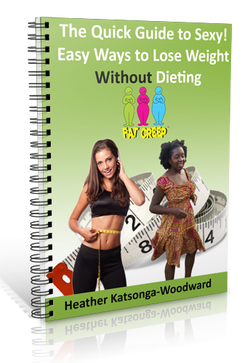 Although your personal finances and your business success are my primary interest, I believe you only operate at peak efficiency when you're fit and healthy. If you feel good, it filters through to your work. To help you with that, click for your free ebook: The Quick Guide to Sexy 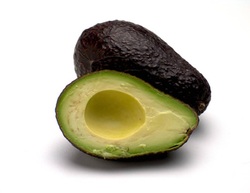 By Heather Fat is a necessary part of a healthy diet but nowadays many of us regularly exceed our recommended fat intake. The average man should eat no more than 95g of fat in a day and the average women needs no more than 70g (food.gov.uk). Excess fat consumption causes weight gain and increased vulnerability to all the problems borne of being being overweight. Here are some tips that will help you cut on fat: 1. Use less fat in the preparation of food:
2. Choose less fatty foods when you eat out and when you prepare your own meals: Fried food is a major problem, it makes non-fatty foods fatty e.g. egg fried rice (just boil rice), fried steaks, chicken and other meats. If it says fried, avoid it. The best dishes to go for are those that are:
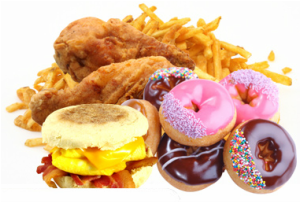 3. Learn which foods have a lot of fat and eat less of them. Foods that contain a lot of fat include:
4. If you eat a lot of dairy (milk, yoghurt, cream and so on) choose the low-fat or reduced fat range. 5. Remove fatty snacks from your regular diet. Consider these treats. You should only need to treat yourself irregularly If you love nuts, stop buying them regularly. Nuts are actually a major stumbling block of mine, I love them and so does my husband so although I try not to buy them, he does! I've asked him to keep them at work but he doesn't want to! He doesn't like touching food with his fingers in a hospital - major problem if you're a nut-loving doctor. 6. Change your meat consumption pattern
7. Handle fatty meat differently to lean meat. If you do buy fatty meat, you can:
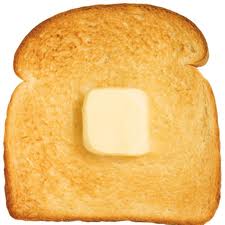 8. Don't add fat to your meals and snacks. These are the main culprits for most people:
9. Make sandwiches without using a spread... ...you might not notice and if you do, you will get used to it. If you buy a sandwich, a bagel or a baguette, check how much spread has been added, if there is more than a sliver - scrape some off. Seriously, I do this. I find the French-styled cafe Paul a very big user of fat. I love my Paul baguettes but I always have to scrape the fat out. 10. Don't have a fried breakfast more than twice a week. If you are on holiday and want to treat yourself you can increase that but remain cautious. When I say no fried breakfast, I am including even something as simple as a one fried egg. No fried breakfasts!! 11. Eat more grains e.g. beans and lentils! They are very low in fat and high in fibre. 12. If you're lucky enough to have a cook or chef teach them how to use less fat. When you stock your cupboards with oil, butter etc, tell them how long you expect that stuff to last. 13. Need to grease a pan? Use spray oil. Some varieties provide only one calorie per spray! Alternatively, instead of pouring oil into the pan, measure it out using a tablespoon. 14. Take a packed lunch to work. You'll save money and calories. Lunch is one-third of your main meals and eating a restuarant bought lunch on daily basis will lead to a lot of extra fat consumption. Avoid it at all costs. I hope these pointers help. If you follow the above rules you should be able to cut your consumption of fat by a huge amount. 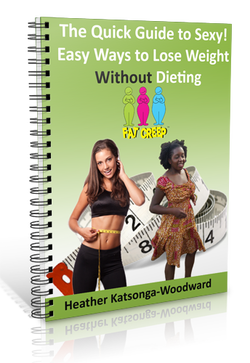 Although your personal finances and your business success are my primary interest, I believe you only operate at peak efficiency when you're fit and healthy. If you feel good, it filters through to your work. To help you with that, click for your free ebook: The Quick Guide to Sexy |
By Heather
|
Heather Katsonga-Woodward, a massive personal finance fanatic.
** All views expressed are my own and not those of any employer, past or present. ** Please get professional advice before re-arranging your personal finances.
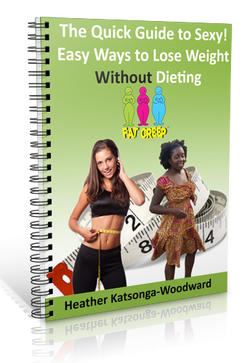
 RSS Feed
RSS Feed


